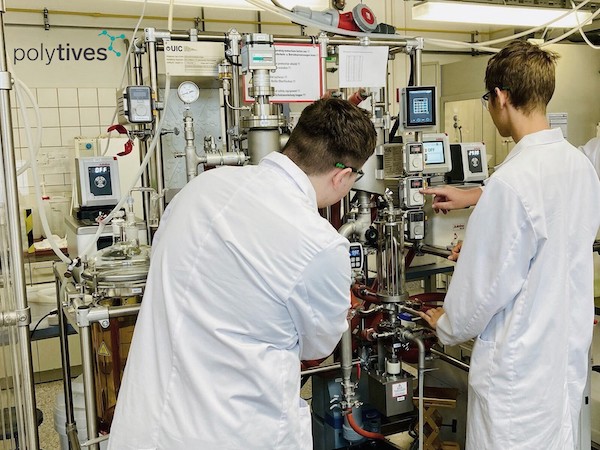
Trainees of the Staatlichen Berufsbildenden Schulzentrums (SBSZ) Jena-Göschwitz do an internship at Polytives
For six weeks, Anton and Yannik completed an internship at Polytives as part of their training as chemical-technical assistants. They were able to put into practice the theoretical knowledge they had already acquired in their school lessons. This brings a professional future in chemistry closer for both of them. In line with the award of the Stifterverband's research seal, we promote education by offering internships. After all, innovation, science and education are our core resources. Only through our chemical know-how we can bring about sustainable change in industry as well as in society as a whole.
The expectations of our interns regarding their time in the laboratory and their tasks corresponded quite well with reality: They had to handle solvents, prepare their own synthesis approaches, operate and maintain the measuring equipment - and of course also manufacture their own products and check them for correctness and purity at the end. An internship at Polytives does not necessarily promise excitement every day - monotonous work is also part of it, as in other companies. It is therefore important to develop a certain degree of routine and still be open to new things. Yannik and Anton decided on a career in chemistry because they already liked chemistry at school and wanted to pursue this in their professional lives. The deciding factor was a career fair and career counseling. Both positively emphasize the active search and advertising of polytives at the SBSZ. Christa Schulze, the supervising teacher, also sees this as an outstanding feature since fewer companies usually come directly to the school.
According to Ms. Schulze, a good connection between schools and industry is particularly important in times of a lack of skilled workers and a decline in applications for training. An active approach of the companies to the trainees is necessary. In this way, feedback from the companies can be used to evaluate whether the content of the training needs to be adapted. In this way, a solid professional future in chemistry can be guarantee.
In addition, according to Ms. Schulze, an internship can teach learners more responsibility as well as teamwork and reliability. We at Polytives agree that both components - the "soft skills" and the implementation of theoretical knowledge in practice - are important and necessary. Only then a professional future in chemistry can become a valuable, reliable foundation for future colleagues on which we all want to build and continue to build.
Recent Comments